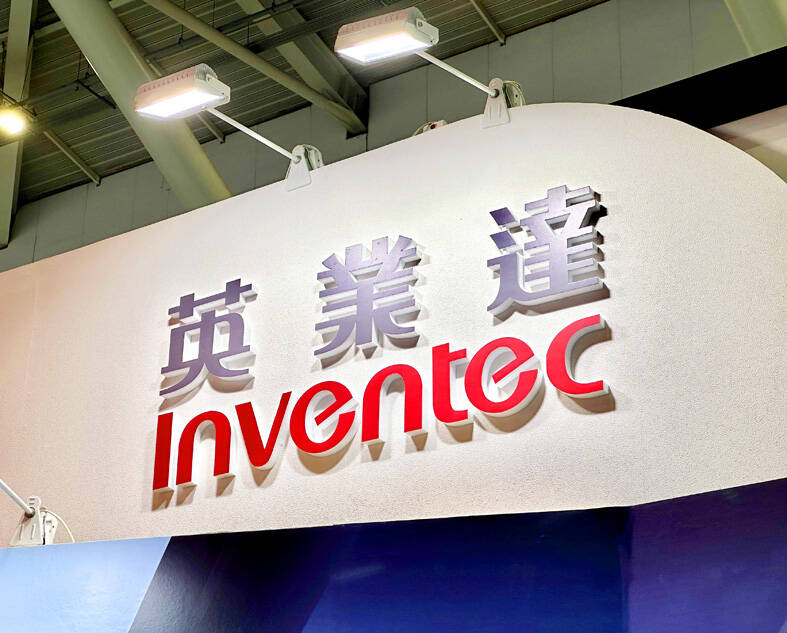Inventec Corp (英業達) has approved an investment plan of up to US$85 million to purchase commercial property and establish a manufacturing base in Texas, as the company seeks to address logistics and shipping needs for its artificial intelligence (AI) server business.
The company’s board of directors approved the investment to support the global strategic expansion of its US subsidiary, stabilize cooperation with existing clients, fulfil customer shipping requirements, explore new markets and mitigate the impact of US President Donald Trump’s tariff policies, Inventec said in a regulatory filing on Monday.
Inventec is searching for a suitable production site in Texas, with the process expected to be completed between next month and December, the company said, adding that the project would be financed through a combination of operational funds and bank loans.

Photo: Fang Wei-chieh, Taipei Times
“The manufacturing base would primarily serve our server product lines,” an Inventec official told the Taipei Times by telephone yesterday. “The decision was made by putting ourselves in our clients’ shoes, as they are the ones bearing the tariff costs. We are trying to meet their needs.”
The planned US$85 million investment does not cover spending on machinery and equipment, with details such as the production timeline still under development, said the official, who requested anonymity.
Inventec president Jack Tsai (蔡枝安) in January told reporters that the company had been seeking locations in the US that could provide a stable electricity supply for its planned manufacturing base, with Texas among the potential sites under consideration.
While the company has already established factories in Mexico to produce servers, notebook computers and automotive electronics, it has been considering expanding into the US, as server products are typically too large and costly to ship.
In addition to Inventec, Wistron Corp (緯創) subsidiary Wiwynn Corp (緯穎) has also accelerated its investment in the US this year in response to Trump’s tariffs.
Wiwynn’s board of directors in February approved a US$300 million capital injection into its US unit to expand operations and establish a new factory in Texas.
Responding to regional production demands, Wiwynn has shifted from an asset-light model — relying primarily on Wistron’s production capacity — to building its own manufacturing facilities over the past few years, with factories now operating in Mexico, the Czech Republic, Taiwan and Malaysia.
“The company will continue to expand and adjust its production capability according to the market need,” Wiwynn chairwoman Emily Hong (洪麗甯) said in the company’s annual shareholders’ report released on Monday.
The company has relocated its Chinese factories elsewhere over the past few years, the report said.
Its assembly plants in Malaysia achieved mass production in 2023, while its motherboard production lines began mass production in the fourth quarter of last year. Wiwynn’s third plant in Mexico also started mass-producing server products in the first half of last year, it added.
With the added capacity and ongoing expansion at its plant in the Southern Taiwan Science Park (南部科學園區), the company’s in-house motherboard production capacity has increased five-fold, while its final-assembly capacity has more than tripled, the report said.
Wiwynn remains optimistic about long-term growth in data center demand, and plans to continue investing in research and development related to AI, computing and heat dissipation technologies, Hong said.
The company also plans to deepen cooperation with technology partners to develop products across a range of computing platforms, including central processing units, graphics processing units and application-specific integrated circuits, while enhancing its advanced cooling and final-assembly capabilities, she said.
To adapt to shifting global trade conditions, Wiwynn would continue implementing automation and smart manufacturing technologies, strengthen client communications and leverage its global production network to ensure stable and flexible operations, she added.

NEW IDENTITY: Known for its software, India has expanded into hardware, with its semiconductor industry growing from US$38bn in 2023 to US$45bn to US$50bn India on Saturday inaugurated its first semiconductor assembly and test facility, a milestone in the government’s push to reduce dependence on foreign chipmakers and stake a claim in a sector dominated by China. Indian Prime Minister Narendra Modi opened US firm Micron Technology Inc’s semiconductor assembly, test and packaging unit in his home state of Gujarat, hailing the “dawn of a new era” for India’s technology ambitions. “When young Indians look back in the future, they will see this decade as the turning point in our tech future,” Modi told the event, which was broadcast on his YouTube channel. The plant would convert

‘SEISMIC SHIFT’: The researcher forecast there would be about 1.1 billion mobile shipments this year, down from 1.26 billion the prior year and erasing years of gains The global smartphone market is expected to contract 12.9 percent this year due to the unprecedented memorychip shortage, marking “a crisis like no other,” researcher International Data Corp (IDC) said. The new forecast, a dramatic revision down from earlier estimates, gives the latest accounting of the ongoing memory crunch that is affecting every corner of the electronics industry. The demand for advanced memory to power artificial intelligence (AI) tasks has drained global supply until well into next year and jeopardizes the business model of many smartphone makers. IDC forecast about 1.1 billion mobile shipments this year, down from 1.26 billion the prior

People stand in a Pokemon store in Tokyo on Thursday. One of the world highest-grossing franchises is celebrated its 30th anniversary yesterday.

Zimbabwe’s ban on raw lithium exports is forcing Chinese miners to rethink their strategy, speeding up plans to process the metal locally instead of shipping it to China’s vast rechargeable battery industry. The country is Africa’s largest lithium producer and has one of the world’s largest reserves, according to the US Geological Survey (USGS). Zimbabwe already banned the export of lithium ore in 2022 and last year announced it would halt exports of lithium concentrates from January next year. However, on Wednesday it imposed the ban with immediate effect, leaving unclear what the lithium mining sector would do in the